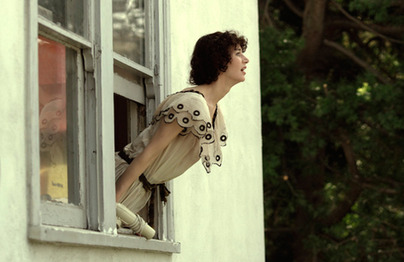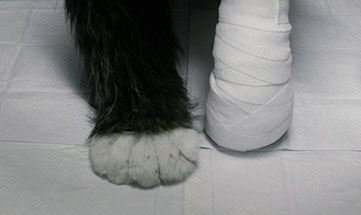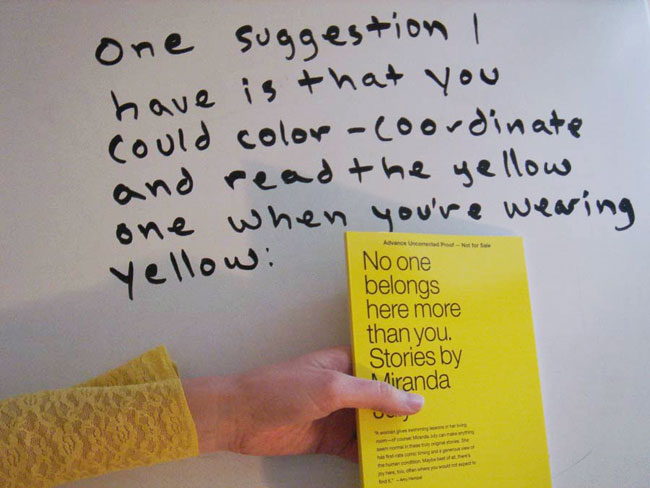by Lacey Haynes
Miranda July, writer, actor and film-maker visits Berlin to open her new feature film, The Future. At the KulturBrauerie Kino in Prenzlauer Berg, she talks about how she connects to her audiences and how her own fears inform her art.
 From my office (sic sparsely furnished spare bedroom) I read articles about Miranda July, preparing for a not-too-likely, but not-altogether-impossible interview. It’s hard not to refer to her simply as Miranda: her projects – You, Me and Everyone We Know, It Chooses You, and No One Belongs Here More Than You – make you feel a sense of proximity to her, as if maybe she’s calling out to you, her best friend, but neither of you know how to find one another. In a lecture recently at The School of Life in London, Miranda urged listeners to connect with one another: “grab hold of the nearest stranger… grasp their arm, firmly. Don’t let go until I tell you to.” Her own desire to find closeness and escape loneliness is at the heart of her new film. Once you have this stranger’s arm, you’re to look at them and say “you did nothing wrong. Go on, you can do it, just let go without really thinking about it,” – linking together two otherwise disconnected individuals. So I did this to Miranda after the screening of The Future, while she was signing autographs. I prefaced my action by telling her I was about to do something awkward. She said okay. Then I grabbed her arm gently (firmly felt too invasive) and said the words she’d told me to say. She was sheepish, “Oh, okay.” I stumbled, “yeah, I read the article earlier, so…” She smiled. I smiled too and shrugged, watched my friend have her book signed, then walked away. But it felt incomplete, I didn’t make the connection. I messed up the words maybe. I felt like one of her characters, sizing myself up, thinking, “you dummy, no one is actually supposed to do that.”
From my office (sic sparsely furnished spare bedroom) I read articles about Miranda July, preparing for a not-too-likely, but not-altogether-impossible interview. It’s hard not to refer to her simply as Miranda: her projects – You, Me and Everyone We Know, It Chooses You, and No One Belongs Here More Than You – make you feel a sense of proximity to her, as if maybe she’s calling out to you, her best friend, but neither of you know how to find one another. In a lecture recently at The School of Life in London, Miranda urged listeners to connect with one another: “grab hold of the nearest stranger… grasp their arm, firmly. Don’t let go until I tell you to.” Her own desire to find closeness and escape loneliness is at the heart of her new film. Once you have this stranger’s arm, you’re to look at them and say “you did nothing wrong. Go on, you can do it, just let go without really thinking about it,” – linking together two otherwise disconnected individuals. So I did this to Miranda after the screening of The Future, while she was signing autographs. I prefaced my action by telling her I was about to do something awkward. She said okay. Then I grabbed her arm gently (firmly felt too invasive) and said the words she’d told me to say. She was sheepish, “Oh, okay.” I stumbled, “yeah, I read the article earlier, so…” She smiled. I smiled too and shrugged, watched my friend have her book signed, then walked away. But it felt incomplete, I didn’t make the connection. I messed up the words maybe. I felt like one of her characters, sizing myself up, thinking, “you dummy, no one is actually supposed to do that.”
After attending the Prenzlauer Berg after-party at the Soda Club with jellyfish-beaded chandeliers, flashing coloured lights, and a sense of importance in the air, I knew the whole shindig didn’t suit Miranda. She was uncomfortable as people approached her excitedly, offering congratulations, asking her questions. Granted, she’s funny and charming. When being asked questions in the large theatre she mistook a pillar for a hand; “Oh wait, that’s part of the architecture – I just called on the building.” But this sense of humour doesn’t translate to a sense of social ease. Like the many characters she crafts, she too is reclusive and solitary, not altogether able to accept these perils of fame that are a result of her accessible yet idiosyncratic art.
 I got back to Kreuzberg and walked, thinking about how everyone at the party could have benefitted from an arm grab. About how Miranda’s characters in The Future could have benefitted from an arm grab. I wanted to redo my own failed attempt at interconnectivity with Miranda by forcing everyone else around us to participate in a web of arm grabs until we all felt a sense of unification. It was dark out on Mariannenstrasse. I thought about how the characters in the film were trying to escape solitude and find the light, figuratively and quite literally, too. Jason (Hamish Linklater) and Sophie (Miranda July) are a passive and tentative couple, each brinking on and ultimately plunging into their respective and very lonely mid-thirties crises. Jason gets lost in the night when he stops time and cannot figure out how to make it start again, while Sophie’s ball and chain is a yellow t-shirt that she can’t stop cuddling which reads “C’est la Nuit” across the chest. The other central character, the saddest of all, is Paw Paw, a talking cat who tragically mewls that the “night is cold and alone.” Paw Paw makes you sad in that deep belly way, like when you hear about a baby who needs surgery or see a puppy with one eye.
I got back to Kreuzberg and walked, thinking about how everyone at the party could have benefitted from an arm grab. About how Miranda’s characters in The Future could have benefitted from an arm grab. I wanted to redo my own failed attempt at interconnectivity with Miranda by forcing everyone else around us to participate in a web of arm grabs until we all felt a sense of unification. It was dark out on Mariannenstrasse. I thought about how the characters in the film were trying to escape solitude and find the light, figuratively and quite literally, too. Jason (Hamish Linklater) and Sophie (Miranda July) are a passive and tentative couple, each brinking on and ultimately plunging into their respective and very lonely mid-thirties crises. Jason gets lost in the night when he stops time and cannot figure out how to make it start again, while Sophie’s ball and chain is a yellow t-shirt that she can’t stop cuddling which reads “C’est la Nuit” across the chest. The other central character, the saddest of all, is Paw Paw, a talking cat who tragically mewls that the “night is cold and alone.” Paw Paw makes you sad in that deep belly way, like when you hear about a baby who needs surgery or see a puppy with one eye.
The Future is based around a delayed cat adoption and the subsequent events as the couple try to make sense of their lives. It at first seems simple. “It’s easy for me to get to the big things through the small things,” Miranda said when asked about the plot. But that “the digging process” through these small issues helps her to get to the big stuff. “Sophie’s territory is all really kind of shameful for me. It’s things that I know I have that I don’t want to think about.” She said she felt like she’d accrued “points” from doing a good job with You, Me and Everyone We Know and because of this new found confidence was able to delve deeper into surrealist elements in this latest film. “I needed some other way to show it (sadness)” than having characters simply sit around crying. So in came absurd and poetic devices: a talking cat, a talking moon, and a crawling t-shirt. The talking moon was perhaps one element too many in this otherwise well executed film, ripe with insightful and sincere interactions, and a warm, funny and at the same time deeply sad plot line.

When I asked Miranda about her tendency towards seeking a sense of intimacy with her audiences, her response was thoughtful. “I think about you (the audience) a lot” and ultimately want “to have some experience of being here, with all of us – together.” The “final dimension” in all of her work, she said, is the audience, and that is something that she takes quite personally
Miranda is like a skittish reverend, teaming with conviction and wise words, but still somehow haunted by feelings of trepidation and uncertainty. These combined qualities are what lend such a sense of humanity and absurdity to projects like The Future. Miranda July wants us to grab each other’s arms and to say words that offer each of us space to breathe, to feel understood. However, she isn’t necessarily saying that it’s easy to initiate or receive such boldness. I asked Miranda a question that she asks Michael in her new book, It Chooses You: “Is there anything you want that you feel like you’ll never have?” She didn’t have an answer. In the story, Michael was transitioning from male to female and all he was waiting for was to be a woman. “I already am a woman,” Miranda said. She was going to think about a better response. As the night closed, the host turned to Miranda – “so, do you have an answer?” he asked. She shook her head, “No.”

You must log in to post a comment.